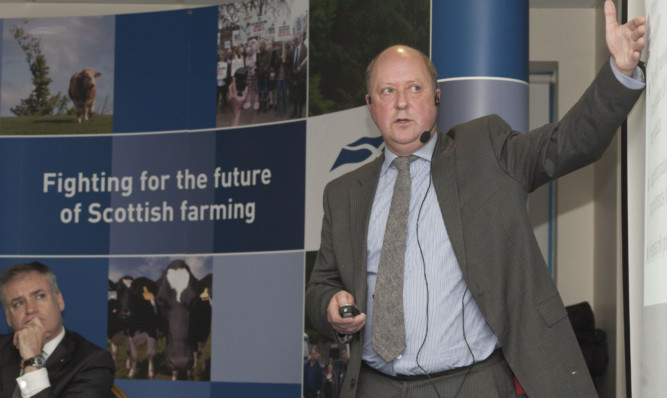Richard Lochhead may have been to every Agriscot since he was appointed Rural Affairs Secretary seven years ago, but he claimed not to know whether this would be his last.
After performing his duties at Ingliston he was off hotfoot to Holyrood to vote for Nicola Sturgeon as First Minister.
Asked if he was likely to be replaced in the widely expected cabinet reshuffle, he said: “Nicola Sturgeon will have a list of names and jobs in her pocket, but I have no idea if my name is on it.”
He had earlier said the new First Minister was “very keen to get her wellies on” and was looking forward to engaging with the sector.
Mr Lochhead also said the last few days had been very emotional as Alex Salmond made his valedictory speeches.
“As First Minister he has been an absolute champion for agriculture and food.”
Mr Lochhead gave no hint of whether he would prefer to move to a new job, but did say by way of a hint: “I love my present portfolio”.
By his furrowed brow, however, he was not as enamoured of Nigel Miller’s opening salvo at the day’s main seminar.
The NFU Scotland president made it abundantly clear there were a number of issues which were the Cabinet Secretary’s responsibilities.
One, which was urgent, was to press Defra ministers over internal convergence.
A satisfactory solution would see all the countries in the UK paying “ a like payment for like land.” In other words, land of similar quality should attract the same payment.
As things stood this was not the case with England and Northern Ireland, in particular, attracting higher rates.
“I know Defra ministers can be awkward, but three times from different ministers I have been given guarantees that this can be done. It is very important that you agree on this realignment before the general election in May,” he told Mr Lochhead.
Mr Miller also pushed hard on the thorny issue of transition from the old CAP to the new.
“This seemed to have disappeared behind closed doors, with the likelihood that the cuts will be more savage than expected in the first two years.”
For too many, the changes would be like “falling off a cliff face”.
Like everything in the CAP, transition was complex. But essentially, by the time National Reserve entitlements were allowed for, as well as the larger Voluntary Coupled Payments Scheme, the budget would be reduced. National Reserve in itself could take around 9% off the budget.
The end result, according to an example given by Mr Miller, was that someone with a 400 euros per hectare payment in 2013 might expect only 225 euros in 2015.
“To give you an actual example from your own constituency: a beef producer there has calculated he will face a 30% deduction, and that means no machinery purchases and no investment,” he told Mr Lochhead.
“A significant majority of our producers are not going to get any benefit from transition.
“If there is not a better model, then you need to get out there and tell people what they are facing. This is something the banks need to be aware of.”
However, Mr Lochhead defended himself, saying: “I am confident we have made the best possible use of resources in the face of an appalling budget.”
He estimated that the budget effect would see this year’s payments due in a couple of weeks, cut by 12%.
There was also a need for new EU Farm Commissioner Phil Hogan to initiate a prompt review of the new CAP.
Once again Mr Lochhead lamented the fact that he was not allowed to be present at EU agriculture meetings.
“I was in Brussels last week and wanted to meet Phil Hogan, but Liz Truss (Defra Secretary) said ‘No’.
“These are ongoing problems and take no account of the new Scottish dynamic.”
He appealed to the agricultural community to engage with the Smith Commission to end this “absurd situation”.
* Agriscot Scotland’s winter farm business show, held at the Royal Highland Centre at Ingliston seems to go from strength to strength, with organisers claiming a record attendance.
It will be some days before registrations at the free-to-attend event are counted, but Agriscot chairman Andrew Moir was confident that last year’s attendance of 11,500 had been comfortably exceeded.
“Going by the catalogues sold, the food sold and the cars in the parks, the numbers are well up,” he said.
To an extent the event had been a victim of its own success, with queues building up on the approaches by mid-morning.
Opening direct access to the West car park from the A8 had eased the situation quickly.
This year a new hall was made available and this had reduced the waiting list of exhibitors, but it still stood at around 50 with more interest expressed on Wednesday.
“We are now using all the indoor space available, and the only way we could expand would be by using marquees.
“These have improved vastly in recent years, but we would need to consider the risk of bad weather at this time of year,” said Mr Moir.
